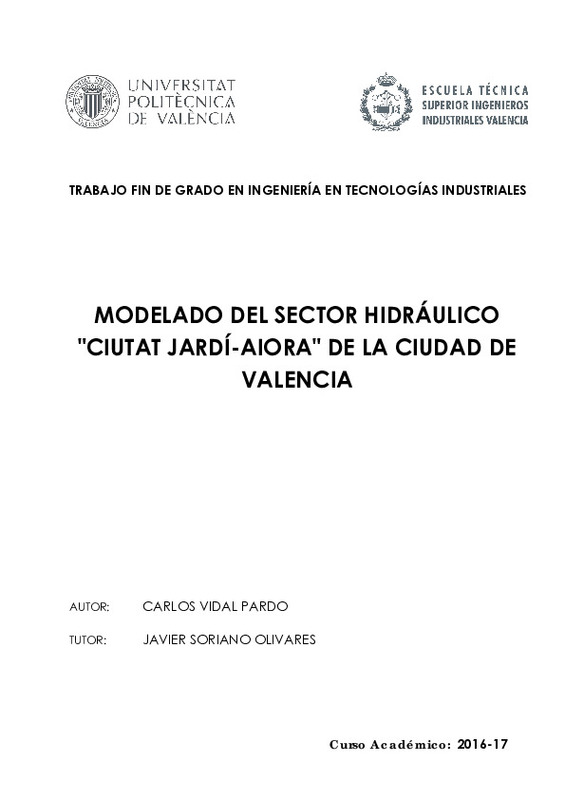|
Resumen:
|
[ES] El trabajo de final de grado que se expone a continuación trata del modelado matemático del sector hidráulico Ciutat Jardí-Ayora de la Ciudad de Valencia. Dicho modelo matemático permitirá a la empresa EMIVASA tener ...[+]
[ES] El trabajo de final de grado que se expone a continuación trata del modelado matemático del sector hidráulico Ciutat Jardí-Ayora de la Ciudad de Valencia. Dicho modelo matemático permitirá a la empresa EMIVASA tener un mejor conocimiento del funcionamiento de la red, lo que permitirá establecer medidas de mejora.
Para calibrar el modelo se partirá de información aportada por la empresa de presiones, caudales de entrada al sector, y, a través de ellos se intentará ajustar el modelo al máximo observando si los caudales de entrada del modelo coinciden con los reales. Para ello se planteará cuatro escenarios donde la variable que se irá modificando es la demanda base principalmente.
Una vez obtenido un modelo con el menor error posible, se asignará como definitivo y a partir de ahí se realizará un estudio de la red que podremos extraer del programa Epanet. Dicho estudio comprenderá el análisis de velocidades del agua, de pérdidas hidráulicas y de presiones. Servirá para observar si se dan ciertas anomalías no deseadas, y en base a esto sugerir un cambio. Si todo funciona correctamente, servirá para comprobarlo.
También se simulará casos extraordinarios en la red, tales como existencia de incendio en un punto o rotura de una tubería (o cierre).
Finalmente se propondrá medidas de mejora de la red de abastecimiento, que supondrán un avance en cuanto a salud y a control como más tarde se verá.
[-]
[EN] The end-of-grade work presented below is about the mathematical modeling of the Ciutat Jardí-Ayora hydraulic sector in the City of Valencia. This mathematical model will allow the company EMIVASA to have a better ...[+]
[EN] The end-of-grade work presented below is about the mathematical modeling of the Ciutat Jardí-Ayora hydraulic sector in the City of Valencia. This mathematical model will allow the company EMIVASA to have a better knowledge of the operation of the network, which will allow to establish improvement measures.
In order to calibrate the model it will be based on information provided by the company of pressures, inflows to the sector, and, through them, we will try to adjust the model to the maximum, observing if the input flows of the model coincide with the real ones. For this, four stages will be proposed where the variable that will be modified is the demand mainly based.
Once obtained a model with the lowest possible error, will be assigned as definitive and from there will be a study of the network that we can extract from the Epanet program. This study will include the analysis of water velocities, hydraulic losses and pressures. It will serve to observe if certain undesirable anomalies occur, and on the basis of this suggest a change. If everything is working properly, it will be checked.
It will also simulate extraordinary cases in the network, such as the existence of a fire at a point or a rupture of a pipe (or closure).
Finally, measures will be proposed to improve the supply network, which will be a step forward in health and control, as will be seen later.
[-]
|







